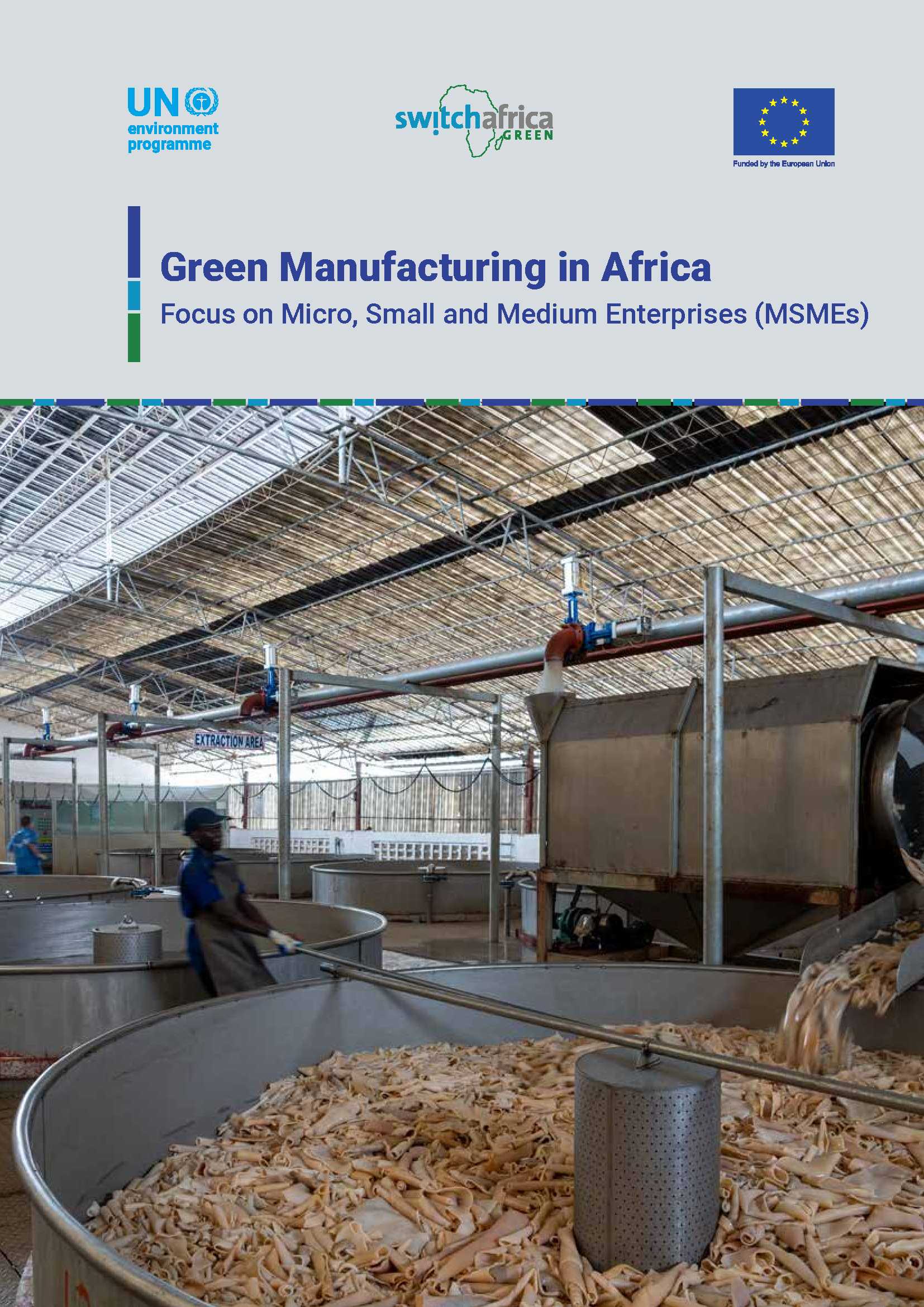The sector report Green Manaufacturing in Africa presents an analysis of the implementation and results of the SWITCH Africa Green programme in the manufacturing sector focusing on the participating countries Burkina Faso, Ghana, Kenya, Mauritius, South Africa and Uganda. It covers the strategic interventions, results realised, cross cutting thematic issues notably energy, water, eco-innovation, labels and standards, sustainable trade and markets, challenges, lessons learnt and presents a set of recommendations.
The report is informed by a SWITCH Africa Green programme survey carried out in May 2018, grantee reports, case studies, peer reviews and regional stakeholder consultations.
The findings in this report reveal that the programme is having a positive impact towards realizing the envisaged changes including economic, social and environmental benefits. The strategic interventions in capacity building and awareness creation have had a positive impact on staff capacity, business skills, and enterprise performance. MSMEs faced various challenges that the project has helped address including inefficient use of resources, lack of business management skills, marketing challenges, and improper waste management. Seventy-eight per cent of the surveyed enterprises reported that they had acquired new skills in areas such as water and energy management, occupational safety, waste management, recycling, record keeping, product development, marketing,
and environmental conservation. Seventy-six per cent of the MSMEs recorded increased sales turnover as a direct result of the programme. Additionally, the implementation of the projects generated new business opportunities. Fifty-nine per cent of the surveyed enterprises reported new opportunities
arising through business expansion and new products. On the social dimension of development, the surveyed firms reported positive gains in terms of job creation, economic activity, and social cohesion, based on the survey data, 3,470 new jobs in the manufacturing sector. Fifty-eight per cent of the surveyed enterprises reported that new jobs had been created during the period of the implementation of the SWITCH Africa Green programme.
Sixty-one per cent of the surveyed enterprises reported to be implementing reduce, reuse and recycle (3R) interventions. About 48 per cent of the enterprises implemented waste reduction and reuse measures involving recycling, reuse, and production of new products and 13 per cent implemented recycling interventions. Water-use and energy-use efficiency assessments and audits that were conducted in Uganda and Mauritius reveal that there are significant opportunities for investment in water and energy efficiency, with huge economic, social and environmental benefits.
Experiences and lessons learnt
About one-third of the surveyed MSMEs indicated that they needed financial support to implement the SCP interventions. Other challenges include lack of resources, behavioral change, and marketing challenges. Most of the surveyed firms acknowledge the importance of the project interventions for their enterprises, including the importance of SCP adoption, quality, improved business process, and
networking for enterprise performance.
Conclusion and recommendations
The evidence from this report reveals that embracing SCP practices has economic, social, and environmental benefits but challenges such as financing, capacity, enabling business environment, and marketing need to be addressed. Based on the analysis and review of the implementation of the programme, the following set of recommendations is presented:
• financing of the transition to sustainable manufacturing should be given priority, including investment in green technologies, and water and energy efficiency;
• capacity building and knowledge sharing is required on relevant SCP principles including adoption and adaptation of relevant technologies, health and safety, resource efficiency and clean production (RECP) techniques;
• strengthen regional and national mechanisms to support SCP in the manufacturing sector including the African Roundtable on Sustainable Consumption and Production (ARSCP) and National Cleaner Production Centers (NCPCs); and
• an integrated approach is needed to align the policy and regulatory environment to support the greening of the manufacturing sector including fiscal incentives to support investments in water and energy efficiency, promote markets for green manufactured goods and technologies including through green procurement, support MSMEs to comply with product quality and environmental standards, implement extended producer responsibility (EPR) measures, and develop an enabling policy environment to exploit the opportunities presented through IS and CE.
The SWITCH Africa Green programme is funded by the EU to support governments and the private sector in African countries (Burkina Faso, Ghana, Kenya, Mauritius, South Africa, and Uganda) in the transition to an inclusive green economy (IGE).

